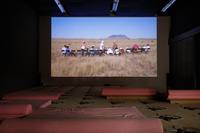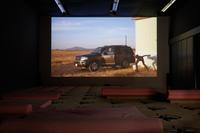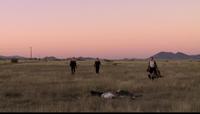Lili Reynaud-Dewar: Beyond the Land of Minimal Possessions
Horror comedy.
Diedrich Diederichsen wrote on film Beyond the Land of Minimal Possession by Lili Reynaud-Dewar: “The scene is set in a desert. A group of attractive, well-dressed twenty-somethings chat light-heartedly in perfect English with a French accent. The little group has come in search of art. But despite the gorgeous landscape, reminiscent of that in Breaking Bad, or Roberto Bolaño‘s posthumous novel 2666, something truly terrible is about to happen… In the desert, the plot unravels. Conversations reminiscent of Beware of a Holy Whore, also a desert-based film, this time directed by Rainer Maria Fassbinder, collide with a Russ Meyer’s vibe: ‘Faster Pussycat, Kill, Kill!’ Where and how will it all end?”1
Art and attractiveness. One of the main lines of the film is the issue of gentrification, associated with good intentions of artists and art institutions to spread art and culture in place that seem otherwise empty and unoccupied. Art and attractiveness. One of the main lines of the film is the issue of gentrification, which is linked to the often well-intentioned intentions of artists and art institutions to spread culture and art in places that seem otherwise empty and unoccupied. The film seems to have an exorcist goal: it wants to banish the entrenched minimalism and modernism from our bodies, and it wants to enjoy it. Minimalism as a dominantly masculine -ism turning into a monument the enclave of Marfa, where the film is shot, and where minimalism is demonstrated as a museum and possessive maximalism.2 By zombifying their bodies, Lili Reynaud-Dewar and her students zombify minimalism, its touristic and capitalist exploitability, and the specificity of a place that is also known for strange luminous phenomena. The theatricality, where the backdrop is Texas nature itself and minimalist works, has its critical antecedent in Michael Fried's famous essay “Art and Objecthood”, revealing the theatricality of minimalist art and the engagement with the physicality of the viewer.
While the film comments on pedagogy of art, the certain tameness of artists in their role as teachers and the emancipation of pedagogical practice, it is also a real excursion of Lili Reynaud-Dewar’s students to the Marfa Symposium. Despite the more than obvious anomalies, temporal dislocations, bodily changes, monstrosities, nightmares and multiple deaths, teaching goes on unabated, as if the academic environment were a protected laboratory and had nothing to do with these events. Seminar guests include Heyd Fontenot, Peter Friel, Michael Smith, Ramaya Tegegne, and Martha Wilson. However, personal situations such as the birthday celebration of Professor Reynaud-Dewar's mother, Mireille Rias, also become part of it. The artist often very consciously mixes documentary with fiction; she, the students and their guests all act as themselves, and at the same time they are all actors playing “themselves”.
By means of her projects, Lili Reynaud-Dewar makes a form of claim, which is reflected in the titles of her works. She keeps the titles, and therefore the themes, to herself for a long time before they are replaced by others. These new demands, which she makes on her own, but on behalf of all, respond to the changing present and needs, and require the social and political norms to respect this dynamic of change. Reynaud-Dewar’s titles are telling: This is my Place; Why should our bodies end at the skin; I Am Intact and I Don't Care; Live Through That?! The 5th Dimension; My Epidemic.
The common starting point of Reynaud-Dewar's work is feminist and queer thought and literature in general, the connection with popular culture, subcultures and countercultures, and a specific form of a kind of feral re-enactment, that broke away from a conceptual foundation and presents more emotional rituals of saying goodbye or communicating with the past or a stigmatized present, a fusion of celebration, critique and self-reflection, whether in terms of ways of functioning and perceiving the body or artistic approaches. Such as when the artist impersonated dancer, actress, singer and activist Josephine Baker and reprised her iconic dance choreography at the Logan Center of Chicago. Reynaud-Dewar, who, in addition to attending the Academy of Fine Arts, also studied at the Ballet Conservatory, can be said to have “danced her way through” most of the institutions she has worked with. This ritual is, in her own words, a “fidgeting and intimate institutional critique” through which she establishes a critical and intimate relationship with the site, leaving behind the stigma of moving her body “dressed” only in paint. The artist says of her performances in an interview for her project Beyond the Land of Minimal Possession: “I like to think of the body as a tool or a means for resistance. The delirious body, the comical body, the naked body, the dancing body, etc. are powerful ways to oppose normative systems and challenge the codes of the traditional white cube gallery… Each actor in the film performed at one point: not only for the camera but also for our crew. Even a very restricted and intimate audience, such as the cast and crew of a film, is still an audience. These short performances are key moments in the film.”
Edith Jeřábková
-
Diedrich Diederichsen: Lili Reyaud Dewar, Interpretations, https://www.emanuellayr.com/wp-content/uploads/2015/03/LRD2019Diedrch-Diederichsen.pdf ↩
-
Donald Judd moved to Marfa in the 1970s and gradually bought up part of this small town to build a monument to minimalism (and to himself). After his death, the Chinati and Judd Foundations have continued this work. ↩
Lili Reynaud-Dewar is a French artist working with the medium of installation, performance, sculpture, text and film. She currently lives in Grenoble. She has exhibited in many prestigious shows such as the 5th Berlin Biennale (2008), 3rd Paris Triennale (2012), 12th Lyon Biennale (2013), 5th Marrakech Biennial (2014), 56. Venice Biennial (2015) and the 11th Gwangju Biennale (2016). She is interested in the limits of biography and has developed her work around various historical figures of transgression, such as Josephine Baker, Cosey Fanni Tutti, Sun Ra, Jean Genet and Guillaume Dustan. She dedicated her project for the Venice Biennale Small Modest Bad Blood Opera to the conflict that sparked opposition to Guillaume Dustan in the late 1990s. In her earlier performances, she explored body language in a studio environment, dancing naked and covered in a layer of paint in an attempt to grasp the space of her studio with her body. In 2009, together with Dorothée Dupuis and Valérie Chartrain, she founded the artistic and entertaining feminist publication Petunia. In 2015, Paraguay Press published a collection of her writings, My Epidemic, texts about my work and the work of other artists. Since 2010, she has been a professor at the Haute École d'Art et de Design in Geneva. Her seminar, which she has long hosted in her hotel room at the Adriatica Hotel in Geneva, is called Teaching as Teenagers and is mostly based on readings by queer and feminist authors. With her Head Geneva students, she made a horror comedy in Marfa, Texas called Beyond the Land of Minimal Possessions. She is part of Wages For Wages Against, a campaign started by Ramaya Tegegne to promote artist fees and a less discriminatory art world in Switzerland and elsewhere. In 2015, she initiated the Maladie d'Amour project in her Grenoble studio as a social and emotional experiment that brings together a small group of young people around one-night exhibitions by artist friends of Lili Reynaud-Dewar.
←→
Special thanks to the Ministry of Culture of the Czech Republic and Moravian-Silesian Region.


